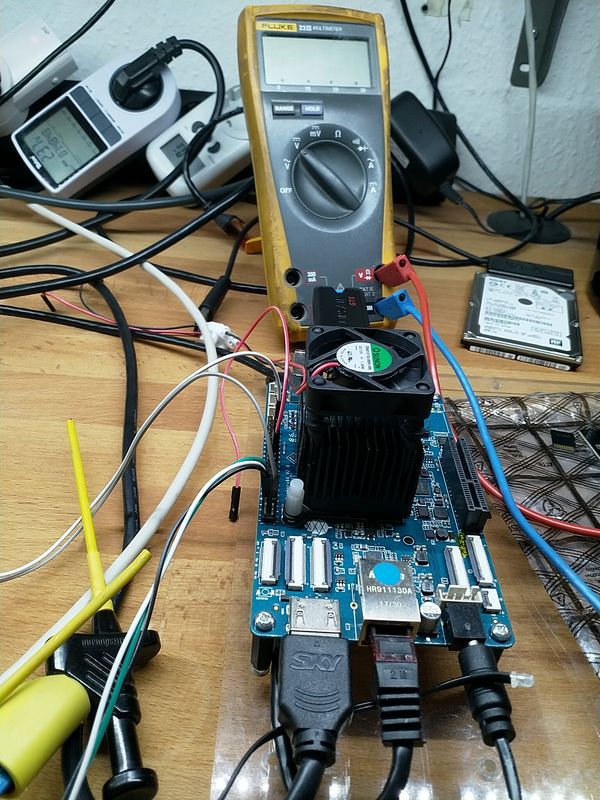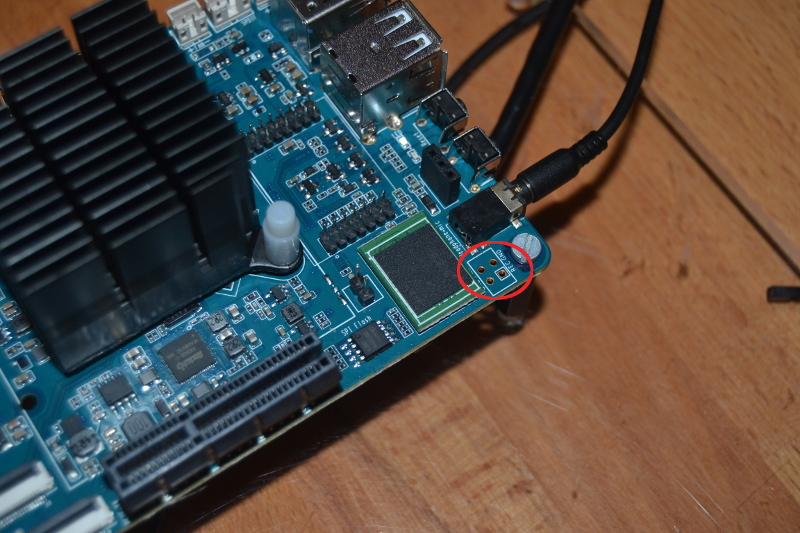ROCKPro64 - USB-OTG funktioniert!
-
Mit Kernel 4.4.154-1109-rockchip-ayufan funktioniert jetzt USB-OTG, schreibt Kamil
 Ok, dann testen wir das mal.
Ok, dann testen wir das mal.Das schreibt Kamil dazu
(12:14:29) ayufan: use this script: https://github.com/ayufan-rock64/linux-package/blob/master/root-rockpro64/usr/local/sbin/rockpro64_enable_otg.sh
(12:14:45) ayufan: configure ip on usb0: ifconfig usb0 169.169.222.222
(12:14:55) ayufan: and run iperf, you should likely see about 200-300MB/sGut, mal eine SD-Karte vorbereitet. Das Script unter /usr/local/sbin angelegt und ausgeführt.
Der usb0 Schnittstelle die IP 192.168.3.155 zugewiesen. So richtig habe ich da nicht durchgeblickt, aber am Ende konnte ich eine Verbindung aufbauen. Auf dem ROCKPro64
iperf3 -seingegeben. Auf dem Haupt-PC
iperf3 -c 192.168.3.155eingegeben. Folgendes Ergebnis habe ich bekommen.
frank@frank-MS-7A34:~$ iperf3 -c 192.168.3.155 Connecting to host 192.168.3.155, port 5201 [ 4] local 192.168.3.156 port 33528 connected to 192.168.3.155 port 5201 [ ID] Interval Transfer Bandwidth Retr Cwnd [ 4] 0.00-1.00 sec 59.8 MBytes 502 Mbits/sec 0 143 KBytes [ 4] 1.00-2.00 sec 72.4 MBytes 607 Mbits/sec 0 150 KBytes [ 4] 2.00-3.00 sec 62.8 MBytes 527 Mbits/sec 0 239 KBytes [ 4] 3.00-4.00 sec 78.3 MBytes 657 Mbits/sec 3 341 KBytes [ 4] 4.00-5.00 sec 89.1 MBytes 747 Mbits/sec 0 433 KBytes [ 4] 5.00-6.00 sec 71.4 MBytes 599 Mbits/sec 213 156 KBytes [ 4] 6.00-7.00 sec 74.6 MBytes 626 Mbits/sec 299 126 KBytes [ 4] 7.00-8.00 sec 72.4 MBytes 607 Mbits/sec 75 148 KBytes [ 4] 8.00-9.00 sec 93.3 MBytes 783 Mbits/sec 120 158 KBytes [ 4] 9.00-10.00 sec 87.5 MBytes 734 Mbits/sec 41 189 KBytes - - - - - - - - - - - - - - - - - - - - - - - - - [ ID] Interval Transfer Bandwidth Retr [ 4] 0.00-10.00 sec 761 MBytes 639 Mbits/sec 751 sender [ 4] 0.00-10.00 sec 761 MBytes 638 Mbits/sec receiver iperf Done.Angeschlossen hatte ich am USB-C Anschluss des ROCKPro64 und an einer USB3-Schnittstelle meines Haupt-PCs. Die USB3-Schnittstelle ist an einem SD-Karten Gerät dran. Es könnte das Ergebnis ein wenig verfälschen, mein Kabel war aber nicht länger
 Soll ja auch nur zeigen das es klappt.
Soll ja auch nur zeigen das es klappt.Was ihr jetzt damit anfangt, weiß ich nicht, ich habe da nicht so direkt eine Idee zu. Viel Spaß beim Testen!

